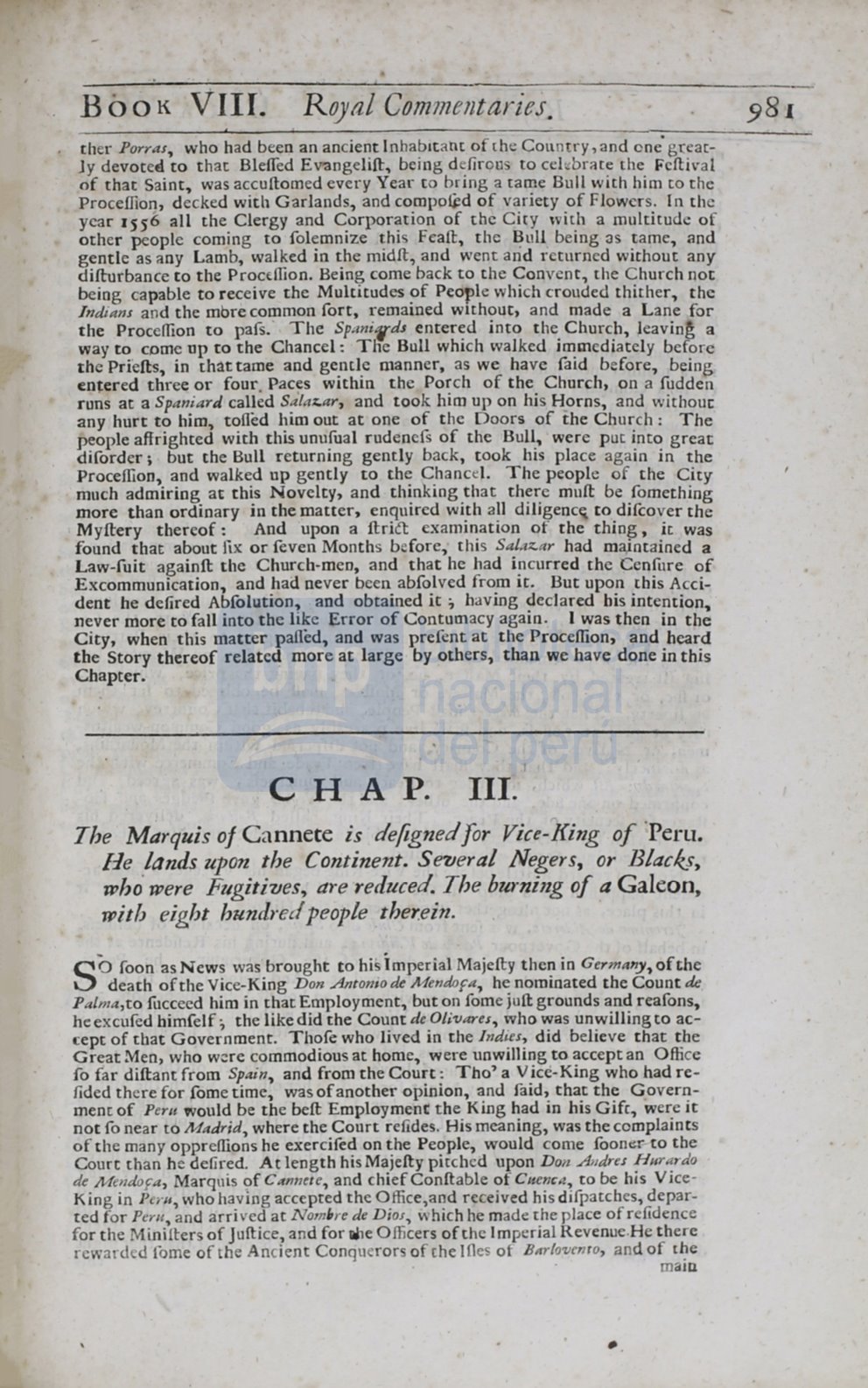

BOOK
VIII.
Royal
Com1nenta1 ies.
•
ther
PorraJ,
who had been an
ancie~t lnha~1tant
of the Country, and cne" gr at–
J
y
devotes to that Blelfed Evangehft., berng d firou
to c l brace the Fefriva l
of that Saint, was accuftomed every Year to bring a tame Bull with him to the
Proceffion, decked with Garlands, and
compoi&d
of variety
of
Flowers. In th
year 1556 all the Clergy and Corporation of the City " ith a multitud of
other people coming to fol7mnize
~hi
Feafr, the
~ull
being as tame, and
gentle as
any
Lamb, walked m the m1dft, and went and returned without
any
diftutbance to the P rocdlion. Being come back to the Convent, the Church not
being capable to receive the Multitudes
?f
People which crouded thither, the
Indians
and the mbre common fort, remained without, and made a Lane for
the Proceffion to pafs. The
Spani':i"ds
entered into the Church, leaving a
way to cpme up to the Chancel: Tfie Bull which walked
immediately
before
the Prfefts, in
that
tame and gentle manner, as we have faid before, being
entered
three
or four.
P
aces within the Porch of the Church, on a fudden
runs at a
Spaniard
called
Salaz.ar,and took him up on his Horns, and without:
any hurt to him, tolfed him out at one of the Doors of the Church : The
people affrighted with this unufual rudenefs of the Bull, were put into great
diforder; but the Bull returning gently back, took his place again in the
Proceffion,_
~nd walk~d
up gently to
th~
C_hancel. The people of the City
much adm1nng at this Novelty, and thmk10g that there muft be fomething
more
than ordinary
in
the matter, enquired with all diligenc
to difcover the
Myftery
thereof:
And upon a
ftriet
examination
of
the thing,
it
was
found that about fix or feven Months b fore, this
Salaz ar
had mafotained a
Law-fuit againft the Church-men, and that he had incurred the Cenfure
of
Excommunication, and had never been abfolved from
it.
But upon this Acci–
dent he defired Abfohttion, and obtained
it ;
having declared his intention
never more to fall into the like Error of Contumacy again.
I was then in
th~
City,
when this matter palled, and was prefent at the Proceffion, and heard
the Story thereof related more
at large
by
others,
than we
have done in this
Chapter.
CH AP.
The Marquis of
Cannete
is defignedfor
Vice-King o
f·Peru.
Ile _lands upon the
Continent. Several Negers,
or
Black.ff,who
were
Fugitives,
are reduced. The burning of
a
Galeon>
with eight hundred people ther.ein.
S
O
foon as News was brought to his imperial Majefty then in
Germany,
ofthe
death of the Vice-King
Don Antomo de Mendopa,
he nominated the Count
de
Palma,
to fucceed
him
in that Employment, but on fome ju
ft
grounds and reafons,
heexcufed himfelf; the like did the Count
de Olivares,
who was unwilling to ac–
cept of that Government. Thofe who lived in the
Indies,
did
believe that the
Great Men, who
w~re
commodious at home, were unwilling to accept an Office
fo
far diftant from
Spain,
and from the Court: Tho' a Vice-King who had re–
fided there for fome time, was ofanother opinion, and faid, that the Govern–
mem: of
Pern
would be the beft
Employment
the King had in his Gifc, were
it
not fo near to
Madrid,
where the Court refides. His meaning, was the complaints
of the many oppreffions he exercifed on the People, would come foon
to the
Court than he defired. At length his Majefty pitch d upon
Don Andru HHrardo
de
M endopa,
Marquis of
Cannet e,
and chief Conftable of
CuencA.,
to be his Vice–
King in
Per11,
who having accepted the O ffice,and received bis difpatches., depar–
ted for
Pent.,
and arri ed at
N omhre
de Dios,
V\
hich he made t he
place of r fidence
fo r t he Mini frers of Juftice, and for r.be O ffi cers of the Impe rial Revenue.He there
rewa d d fome of he
Ancient
Conque ro r of the
lfle~
o
B11rlovenro,
and of
t~e
main














